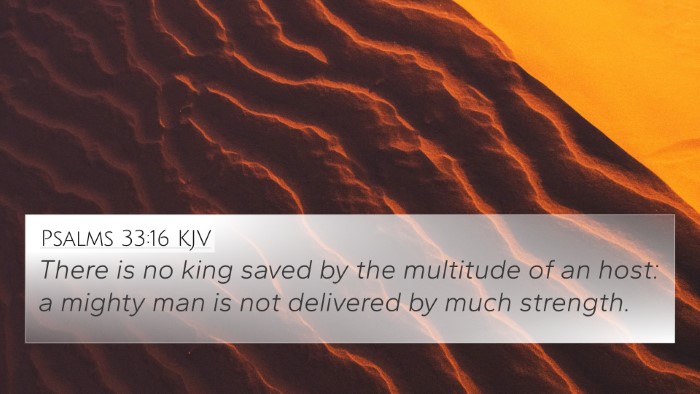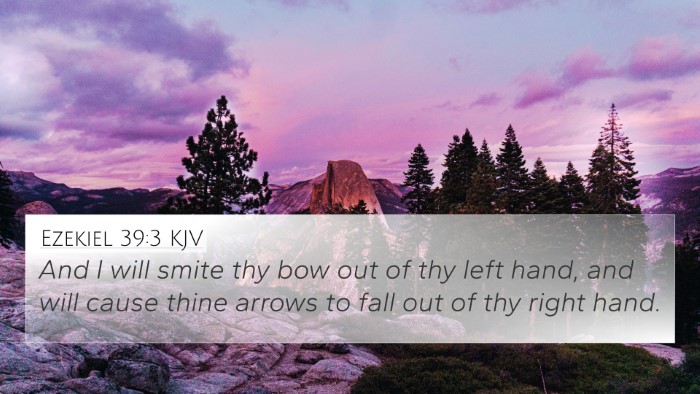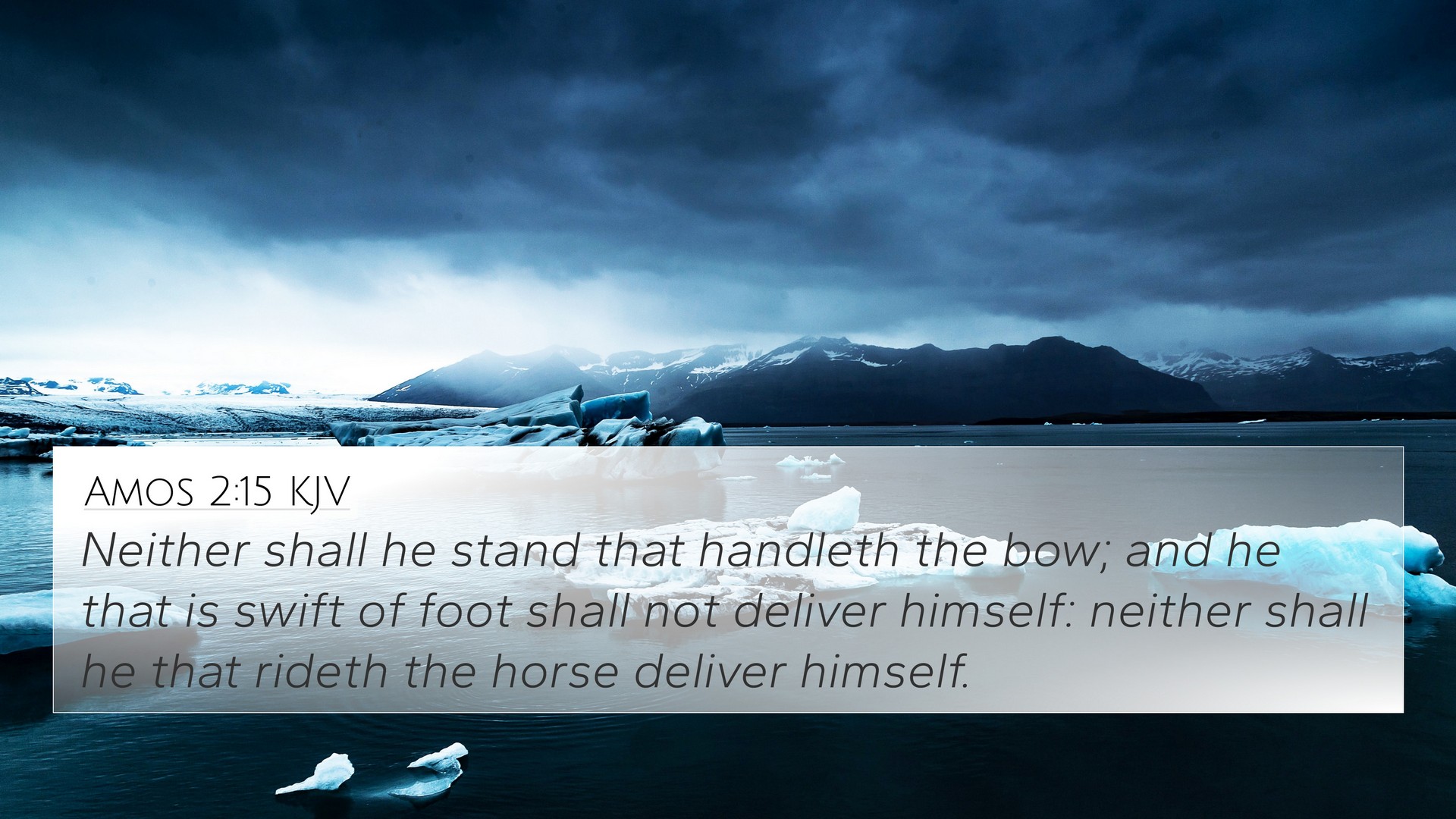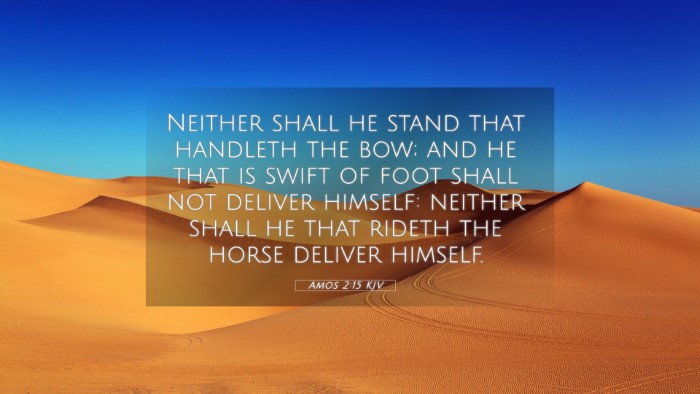Old Testament
Genesis Exodus Leviticus Numbers Deuteronomy Joshua Judges Ruth 1 Samuel 2 Samuel 1 Kings 2 Kings 1 Chronicles 2 Chronicles Ezra Nehemiah Esther Job Psalms Proverbs Ecclesiastes Song of Solomon Isaiah Jeremiah Lamentations Ezekiel Daniel Hosea Joel Amos Obadiah Jonah Micah Nahum Habakkuk Zephaniah Haggai Zechariah MalachiAmos 2:15 Similar Verses
Amos 2:15 Cross References
Neither shall he stand that handleth the bow; and he that is swift of foot shall not deliver himself: neither shall he that rideth the horse deliver himself.
Uncover the Rich Themes and Topics of This Bible Verse
Listed below are the Bible themes associated with Amos 2:15. We invite you to explore each theme to gain deeper insights into the Scriptures.
Amos 2:15 Cross Reference Verses
This section features a detailed cross-reference designed to enrich your understanding of the Scriptures. Below, you will find carefully selected verses that echo the themes and teachings related to Amos 2:15 KJV. Click on any image to explore detailed analyses of related Bible verses and uncover deeper theological insights.

Psalms 33:16 (KJV) »
There is no king saved by the multitude of an host: a mighty man is not delivered by much strength.

Ezekiel 39:3 (KJV) »
And I will smite thy bow out of thy left hand, and will cause thine arrows to fall out of thy right hand.
Amos 2:15 Verse Analysis and Similar Verses
Understanding Amos 2:15
Amos 2:15 states: "Neither shall he that rideth the horse deliver himself: and he that is swift of foot shall not deliver himself." This verse reflects God's judgment upon Israel, emphasizing the futility of relying on human strength and speed in times of divine reckoning.
Contextual Overview
The Book of Amos is a prophetic text that articulates God's message to the Northern Kingdom of Israel during a time of prosperity and moral decay. Amos, a shepherd and fig farmer, speaks with authority about impending judgment due to social injustice and spiritual apathy. This specific verse serves as a continuation of the theme of inevitable judgment and the inability of Israel to escape their fate.
Thematic Analysis
Several themes emerge from Amos 2:15 that highlight its significance within the larger scriptural narrative:
- Human Limitations: The imagery of horses and swift runners suggests a reliance on human abilities, which are ultimately futile in the face of divine judgment.
- Judgment and Accountability: This verse underscores the certainty of God's judgment. It indicates that there will be no escape for those who have turned away from God.
- Divine Sovereignty: The verse asserts God’s authority over all creation, showcasing that not even the mightiest can withstand His will.
Commentary Insights
Public domain commentaries shed light on various aspects of Amos 2:15:
Matthew Henry
Matthew Henry interprets this verse as a stark warning regarding the impending doom of Israel. He emphasizes that those who thought they could rely on their strength would find themselves powerless before God's judgment. Henry notes that the “horse” symbolizes military might and speed, but these qualities will not provide deliverance in the day of the Lord's wrath.
Albert Barnes
Albert Barnes elaborates on the uselessness of preparations for escape. He states that a person who rides swiftly or runs quickly will be unable to flee from divine judgment. This communicates a profound lesson about the limitations of human endeavors compared to the omnipotence of God. Barnes encourages readers to reflect on their spiritual condition in light of divine authority.
Adam Clarke
Adam Clarke discusses the historical context of the verse, connecting it to the military defeats faced by Israel and Judah. Clarke argues that no matter how fast or strong an individual may believe themselves to be, when God’s judgment is pronounced, it is irrespective of human effort.
Connections Between Bible Verses
Amos 2:15 resonates with various themes found across Scripture. Here is a list of relevant Bible cross-references that echo the messages surrounding Amos 2:15:
- Isaiah 31:3: “Now the Egyptians are men, and not God; and their horses flesh, and not spirit…” This verse highlights the futility of depending on human resources.
- Jeremiah 17:5: “Cursed is the man who trusts in man and makes flesh his strength…” This reflects the idea of misplaced trust that Amos warns against.
- Psalms 20:7: “Some trust in chariots and some in horses, but we trust in the name of the Lord our God.” This underscores the theme of trusting in God versus human might.
- Proverbs 21:31: “The horse is made ready for the day of battle, but the victory belongs to the Lord.” This echoes the sentiment that God controls the outcomes, not human effort.
- Job 24:1: “Why are not times of judgment kept by the Almighty, and why do those who know him never see his days?” Reflects a challenge to the perceived absence of judgment in human affairs.
- Isaiah 40:30-31: “Even youths shall faint and be weary, and young men shall fall exhausted; but they who wait for the Lord shall renew their strength…” emphasizes reliance on God for strength.
- Zephaniah 1:17: “I will bring distress upon mankind, so that they shall walk like the blind, because they have sinned against the Lord…” connects the theme of judgment and accountability.
- Ezekiel 18:30: “Therefore I will judge you, O house of Israel, everyone according to his ways, declares the Lord God…” stresses the theme of accountability to God’s standards.
- Hosea 14:3: “In you the orphan finds mercy.” That indicates the prophetic hope that follows judgment, showing God's character in dealing with humanity.
- John 15:5: “I am the vine; you are the branches. Whoever abides in me and I in him, he it is that bears much fruit, for apart from me you can do nothing.” This new covenant context complements the message of dependence on God rather than self-reliance.
Conclusion
Amos 2:15 serves as a critical reminder of the limitations of human capability when faced with divine judgment. Through the insights garnered from public commentaries and the connections established through cross-references, we gain a deeper understanding of the text's implications for faith and spiritual resilience. It encourages believers to renounce reliance on self and to trust wholly in God's sovereign judgment and mercy.
Further Study Tools
For those interested in exploring connections between Bible verses, several resources can facilitate a deeper study:
- Bible concordance
- Bible cross-reference guide
- Cross-reference Bible study methods
- Bible reference resources
- Bible chain references
- Comprehensive Bible cross-reference materials
- Tools for Bible cross-referencing


